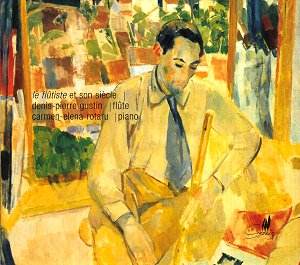This generously filled collection of 20th
Century music for flute is quite remarkable, in that it does not
include any of the now traditional warhorses such as Poulenc’s
sonata or Roussel’s Joueurs de flûte
but rather focuses on Belgian composers. For that only,
it would be worth having though it has many other riches to offer.
Jongen’s Danse lente Op.56
for flute and piano or harp is a delightful, nostalgic miniature
composed in the early years of World War I when the composer lived
in England. Stekke’s short pieces as well as Poot’s Legend
were composed as test pieces; but both were fine composers in
their own way and always managed to write music that puts demands
on the players as well as delights the listener. Stekke is a neglected
composer though his beautiful Nocturne Op.5 and
his delightful Scherzo capriccioso Op.19 have always
been much favoured by professional as well as budding flautists.
This recording marks the welcome return of these pieces to the
catalogue. I often compare the late Marcel Poot to Gordon Jacob,
in that he could write attractively and expertly for whatever
medium. Moreover, while being fairly traditional, his music is
quite personal and instantly recognisable. His Legend
for flute and piano is a good example of his musicmaking. Jacques
Leduc is a highly respected composer who patiently and painstakingly
composed a sizeable body of substantial works, all characterised
by his superb craftsmanship and elegant Neo-classicism. His substantial
Flute Sonata Op.21 of 1966 is no exception; and
is the major work in this fine recital. Its three movements follow
the traditional pattern, although Leduc’s undogmatic approach
always has surprises in stock. His music, traditional as it may
be, has a remarkable freshness of invention expressed in subtle
refined harmonies. It is not without a touch of humour as in the
spirited third movement of this sonata. If you know and love,
say, Lennox Berkeley’s music, then you need not hesitate: Leduc’s
music is also for you.
One rather tends to forget that Eugene Goossens
had his roots in Brugge, and actually the first of his Three
Pictures Op.55 is inspired by reminiscences of his early
years there. The second picture is based on a well-known folk
song from the Cotswolds whereas the third movement is a fanciful
Nocturne inspired by Montmartre. This lovely work, still too rarely
heard, also exists in a version for flute, strings and percussion
which I have never heard, though I think (but am not sure) that
it has been recorded. Anyway, the flute-and-piano version is thoroughly
effective and quite enjoyable.
Chinese-born Hao-Fu Zhang studied at the Ecole
Normale in Paris and at the Royal Conservatory in Brussels. His
composition teachers include Edison Denisov, Jacqueline Fontyn,
Yoshihisa Taïra and Jacques Leduc. His Théâtre
pour deux was composed on commission from the Ars Musica
festival in Brussels. As that of some of his contemporaries (Chen
Yi, Zhou Long, Qigang Chen and Bright Sheng), his music draws
on his musical roots and attempts a reconciliation between Eastern
and Western musical traditions while avoiding superficial pictorialism.
Théâtre pour deux consists of two parts
of fairly equal length but of highly contrasted character. Libero
is improvisatory in character whereas Moderato e misterioso
is in the form of a theme and variations. This piece, which was
new to me, is a quite attractive work of great refinement and
beauty. A most welcome novelty, as far as I am concerned, that
should be heard more often.
This attractive selection of unfamiliar works
for flute and piano, superbly played throughout and warmly recorded,
is one of the most enjoyable discs I have heard recently. Recommended,
were it only for pleasure’s sake.
Hubert Culot
